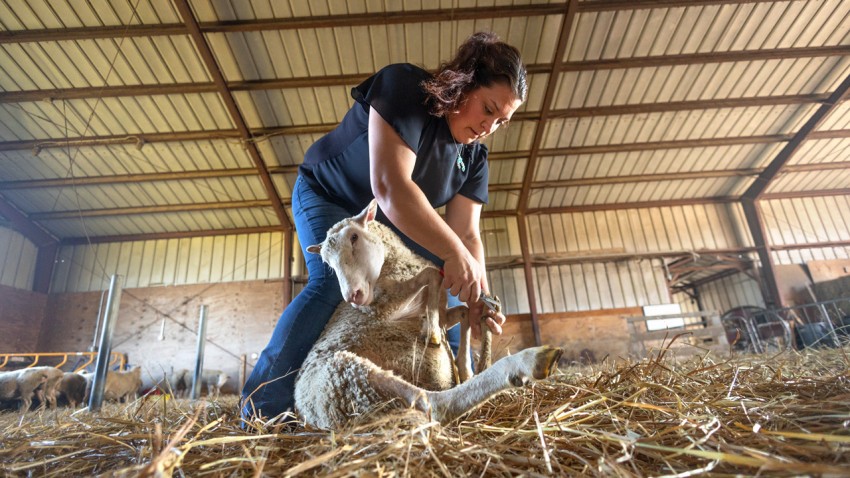Education
Cornell and New York State Boost Livestock Farmers’ Potential

New York State is investing significantly in its livestock farmers as demand for locally sourced products continues to rise. Cornell University has launched the PRO-LIVESTOCK program, aimed at supporting cattle, goat, and sheep farmers across New York. This initiative, backed by funding from the New York State Department of Agriculture and Markets, seeks to enhance the resources available to livestock producers in the region.
In late July, Adam Murray, Cornell’s new beef cattle extension specialist, conducted a live assessment of cattle at Hidden Canyon Farms in Lyons, New York. This event attracted 35 beef producers eager to learn practical skills. Murray’s assessment included an analysis of DNA test results, showcasing how farmers can utilize various tools to improve their livestock. According to Sue Olson, co-owner of Hidden Canyon Farms, such hands-on training is invaluable. “You could actually see things instead of looking at a PowerPoint,” she noted, emphasizing the importance of knowledge transfer in the beef industry.
PRO-LIVESTOCK Program Launches
The PRO-LIVESTOCK initiative is modeled after Cornell’s successful PRO-DAIRY program, which has supported dairy farmers for over 35 years. The program aims to provide science-based guidance for livestock farmers, particularly after a survey by the Cornell Small Farms Program indicated that 85% of New York livestock producers require more assistance in production and market development.
“There’s such a need for more science-based resources from New York,” said Nancy Glazier, a small farms and livestock specialist at Cornell Cooperative Extension. She advocates for the program, stating that it is crucial for farmers to have access to experts who can help them navigate industry challenges. The program is expected to expand its offerings to include specialists in poultry, swine systems, and livestock processing.
The funding for PRO-LIVESTOCK was secured through the efforts of New York State Senator Michelle Hinchey and Assemblywoman Donna Lupardo. Hinchey expressed her pride in securing this funding, highlighting the program’s potential to support all sectors of New York agriculture.
Industry Demand and Economic Impact
Last year, beef cattle production in New York generated nearly $500 million, with revenue more than doubling from 2017 to 2022. The demand for local goat and sheep products is also increasing, along with the need for sheep grazing under solar arrays. Murray and his colleagues have been actively reaching out to farmers throughout the state, conducting forums and meetings to disseminate information about PRO-LIVESTOCK.
According to Jessica Waltemyer, Cornell’s new small ruminant extension specialist, supporting local agriculture is vital for food security. “There’s a high demand for local- and state-grown products,” she stated. The program aims to ensure that future generations of farmers can sustain profitable operations.
Murray intends to leverage New York’s agricultural strengths, such as its rich grasslands, to help farmers optimize their production systems. He envisions establishing a beef cattle herd back on Cornell’s campus, which would serve as a resource for hands-on learning and research opportunities. This initiative would allow producers to send their weaned calves to Cornell while retaining ownership, a strategy aimed at increasing the value of their livestock through improved health management and standardization.
“New York’s not just a dairy state. It’s an agriculture state,” Murray asserted, emphasizing the need to promote beef production alongside dairy farming.
Building Trust and Collaboration
The importance of consistent veterinary care for small ruminants is another focus for Waltemyer. She has been addressing issues related to the barber pole worm, a parasite that poses significant challenges for sheep and goats. Her outreach efforts have included webinars that attracted over 450 registrants, demonstrating the demand for information and support.
Waltemyer’s commitment extends to engaging with young farmers and students, aiming to foster a new generation of agriculturalists. She manages a 220-acre farm with a diverse array of livestock, illustrating her dedication to the industry.
Mary Jeanne Packer, founder of Battenkill Fibers, New York’s largest commercial spinning mill, has experienced substantial growth since her establishment in 2009. The demand for locally sourced yarn has driven her business to nearly $1 million in sales last year. Packer credits Cornell and its extension services for providing essential support and research. “They exist just to take the most current research and share that knowledge,” she remarked, highlighting the trust that farmers place in academic institutions.
As New York State continues to bolster its agricultural initiatives, the PRO-LIVESTOCK program stands as a promising development for livestock farmers. With the potential for collaboration and knowledge exchange, the future of the state’s livestock sector appears both bright and sustainable.
-

 Technology5 months ago
Technology5 months agoDiscover the Top 10 Calorie Counting Apps of 2025
-

 Health2 months ago
Health2 months agoBella Hadid Shares Health Update After Treatment for Lyme Disease
-

 Health3 months ago
Health3 months agoErin Bates Shares Recovery Update Following Sepsis Complications
-

 Technology4 months ago
Technology4 months agoDiscover How to Reverse Image Search Using ChatGPT Effortlessly
-

 Technology1 month ago
Technology1 month agoDiscover 2025’s Top GPUs for Exceptional 4K Gaming Performance
-

 Technology2 months ago
Technology2 months agoElectric Moto Influencer Surronster Arrested in Tijuana
-

 Technology5 months ago
Technology5 months agoMeta Initiates $60B AI Data Center Expansion, Starting in Ohio
-

 Technology5 months ago
Technology5 months agoRecovering a Suspended TikTok Account: A Step-by-Step Guide
-

 Health4 months ago
Health4 months agoTested: Rab Firewall Mountain Jacket Survives Harsh Conditions
-

 Lifestyle5 months ago
Lifestyle5 months agoBelton Family Reunites After Daughter Survives Hill Country Floods
-

 Technology4 months ago
Technology4 months agoHarmonic Launches AI Chatbot App to Transform Mathematical Reasoning
-

 Technology3 months ago
Technology3 months agoUncovering the Top Five Most Challenging Motorcycles to Ride





















